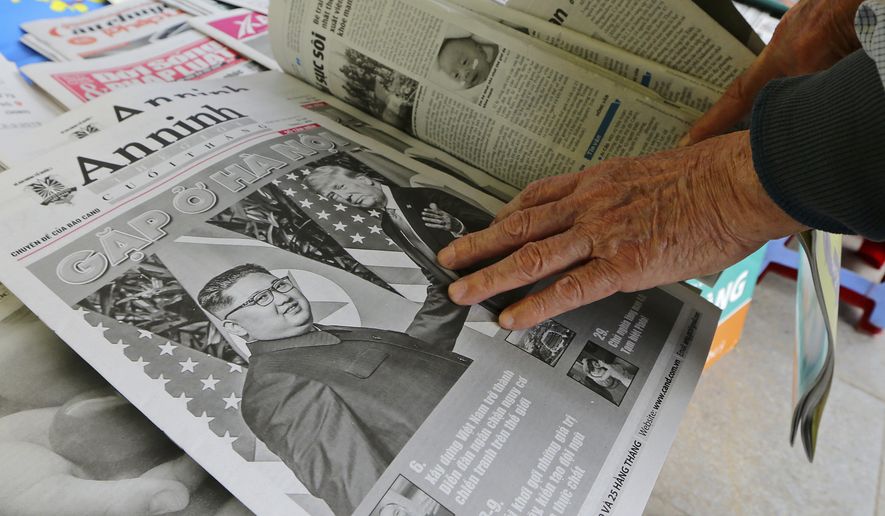By Ethan Epstein
 “Potential” is probably the wrong word to use. When President Trump tries to coax North Korean dictator Kim Jong-un to trade nuclear arms for investment, he rhapsodizes often about the great “potential” that he sees in North Korea. (Ever a real estate guy, the president seems particularly fond of North Korea’s shoreline.) But to say someone has great “potential” is to imply they’re not living up to it. That almost certainly is perceived as an insult by the North Korean regime, whose propaganda bangs on incessantly about the inherent superiority of its system.
“Potential” is probably the wrong word to use. When President Trump tries to coax North Korean dictator Kim Jong-un to trade nuclear arms for investment, he rhapsodizes often about the great “potential” that he sees in North Korea. (Ever a real estate guy, the president seems particularly fond of North Korea’s shoreline.) But to say someone has great “potential” is to imply they’re not living up to it. That almost certainly is perceived as an insult by the North Korean regime, whose propaganda bangs on incessantly about the inherent superiority of its system.Is the “potential” insult the reason that talks between the president and Mr. Kim collapsed in Hanoi? Certainly not exclusively. Contrary to John F. Kennedy’s quote, failure has many, many fathers. But whatever the reasons behind the abrupt end to the Kim-Trump “beautiful friendship,” there will be widespread collateral damage beyond the two principals involved.
The most obvious loser is South Korean President Moon Jae-in. Mr. Moon, a thoroughgoing leftist presiding over a stagnating economy that is hammering his poll ratings, has staked his presidency on increased integration between the two Koreas. Indeed, it was his administration that midwifed the first summit between Mr. Trump and Mr. Kim. But now Mr. Moon’s plans for further economic cooperation with the Kim regime will be stymied by the international sanctions that look set to stay in place for the foreseeable future. The collapse of the talks also will call into question whether a scheduled visit to Seoul by Kim Jong-un will go forward. That visit was to be a crowning achievement in Mr. Moon’s engagement strategy.
The government of Vietnam, the summit’s enthusiastic host, also will be disappointed. So too will Moscow, which would like an end to sanctions on North Korea.
But the biggest loser of all may have been China. Beijing, irritated by the nuclear-armed regime on its eastern border while it simultaneously works to manage threats on its restive western edge, clearly wanted this summit to succeed. Consider the extraordinary measures it took to foster Mr. Kim’s train journey to Vietnam.
For 60 hours, Mr. Kim rode the Chinese rails. This was a significant undertaking, wreaking havoc on China’s extensive railroad network, which millions of people use every day. The security investment on the part of the Chinese must have been tremendous. The investment in internet “security” certainly was. Chinese censors worked overtime deleting any references to Mr. Kim’s magical mystery tour lest anyone figure out where he was at any given time. This shows, if nothing else, that Beijing really, really wanted Mr. Kim to make a deal. It’s also telling that, immediately after the collapse of the talks, members of Mr. Kim’s entourage immediately flew to Beijing. It was as if they had been summoned.
But perhaps even more upsetting to Beijing than the collapse of the talks themselves will be what Mr. Trump’s behavior says about his negotiating style. Washington and Beijing are in the midst of heated trade negotiations, after all. And on a recent visit to Beijing, people I met were positively rubbing their hands in anticipation of what they expected to be a forthcoming Trump cave-in on various sticky trade issues, notably forced technology transfers and intellectual property theft.
But now, Mr. Trump has shown he’s willing to walk away from a deal that he perceives as bad. This will cause no small amount of heartburn in Beijing. The “potentials” for China suddenly just got a lot worse.
⦁ Ethan Epstein is deputy opinion editor of The Washington Times. Contact him at eepstein@washingtontimes.com or on Twitter @ethanepstiiiine.
